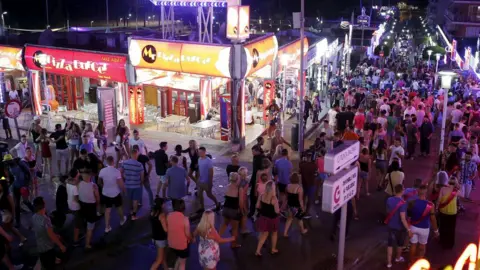Spain's Magaluf and Ibiza crack down on alcohol-fuelled holidays
 Reuters
ReutersSpain's Balearic Islands have passed a law banning pub crawls and happy hours in three popular tourist destinations in a bid to crack down on alcohol-fuelled holidays.
Restrictions apply to the tourist hotspots of Playa de Palma and Magaluf in Majorca and Sant Antoni in Ibiza.
The regional government said it was the first law of its kind in Europe.
Ibiza and Majorca have long been magnets for young British, German and Irish tourists.
The measures adopted on Friday are just the latest effort by authorities to try to rein in heavy drinking on the Mediterranean islands.
But some traders say the move could hurt small businesses.
What are the new measures?
The new law includes a string of measures aimed at cracking down on so-called "booze tourism", where visitors are encouraged to binge drink.
Organised pub crawls can no longer be advertised or held in Playa de Palma, Magaluf or Ibiza's West End.
The law also bans happy hours and says party boats can no longer advertise in the three areas or pick up or drop off tourists there.
Alcohol vending machines, free bars and adverts for alcoholic drinks are also forbidden, while authorities say shops selling alcohol must close from 21:30 to 08:00 (20:30 to 07:00 GMT).
The new regulations have also outlawed "balconing", where people jump from hotel balconies, often into swimming pools. The practice has been linked to a number of tourist deaths and injuries. Authorities said those caught taking part in the activity would now be forced to leave their hotel and could face fines.
Local businesses caught violating the new law could face fines of up to €600,000 (£510,000) or be shut down for up to three years.
The regional government said the law was the first in Europe to restrict the promotion and sale of alcohol in certain tourist zones.
It said the new measures would "fight excesses" and "force a real change in the tourism model of those destinations".
But some complained that the law would hurt the local economy.
"I find this exaggerated and disproportionate," Jose Tirado, president of Majorca's Tourism Services and Businesses Association, told Spain's state television.
